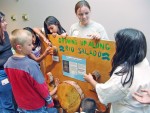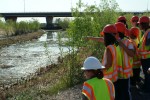Service at Salado is an exemplary LTER education program in which scientists and schoolchildren have joined forces to help re-establish an urban riparian area. School children participating in after-school clubs in the CAP LTER study area are gaining experience in ecology and civic involvement and coming to see themselves as agents of change in conserving and improving their local landscape.
Since 1998, the City of Phoenix, Arizona, and the US Army Corps of Engineers have been restoring the Salt River, a river bed that runs through the heart of rapidly urbanizing Phoenix. The "Rio Salado" Project is creating a preserve easily accessible to city-dwellers, with miles of walking trails, wetland ponds, and restored habitats. The City always envisioned Rio Salado Park as a place where citizens could learn about their local environment and help care for it.
"Helping the students realize (their place in the community) through discussions and taking trips within their community was empowering for me. I feel as if we made an imprint in their mind to have a positive outlook on where they live and how they can be a member. I believe that being able to give them an idea or a small sense of involvement they may take this with them into their future and create more positive contributions. I am able to take my experiences using them in the future when working with other communities.”—Elizabeth Glowacki (Urban Planning, Junior, Fall 2005)
Service at Salado draws upon the resources of the Rio Salado Project and CAP LTER's home institution, Arizona State University (ASU), to link interdisciplinary concepts about the urban ecosystem with environmental stewardship. CAP LTER's Ecology Explorers Program (ecologyexplorers.asu.edu) obtained funding from the Nina Mason Pulliam Charitable Trust, ASU's University-School Partnerships, and NSF LTER EdEn funds to establish after-school clubs at four elementary schools in South Phoenix. Participating schools are in areas surrounding the Rio Salado Project, characterized by large Hispanic populations and underperforming schools.
“This experience has brought me closer to real life and the reality of being a minority child in the inner city. I grew up in the same situation as many of these kids, but it seems like the older I get, the more I forget my past, and where I came from.” —Teresa Yacoub (Biology, Sophomore, Fall 2005)
CAP LTER graduate students and researchers participate as "guest speakers" to the clubs.
Children investigate the natural world with their ASU mentors and develop permanent projects for Rio Salado Park. They learn to work as a team as they design, propose, and implement ideas that will become permanent fixtures of their local landscape. The caliber of their creations has been outstanding. Student projects have included information sheets and posters for park kiosks, painted trash cans, stepping stones with animal footprints, bird houses, bat boxes, an informational spinning wheel, a rain gauge with a booklet explaining how animals depend upon rain, a calendar of local birds, and a digital video disc (DVD) cartoon about the invasive bullfrog.
To date, nearly 350 middle-school students and 50 ASU undergraduates have participated in the program. The clubs proved to be so popular that in Fall 2005, one school was forced to institute a lottery system to select participants. Service at Salado has introduced science and technology as viable career options to a host of middle-school students and shown them the impact of community service. The value of Service at Salado is not limited to local schoolchildren and their communities; ASU undergraduates run the clubs and learn how to design an environmental-education program, develop inquiry-based lessons, mentor schoolchildren, and communicate science to a diverse audience.

 Enlarge this image
Enlarge this image
